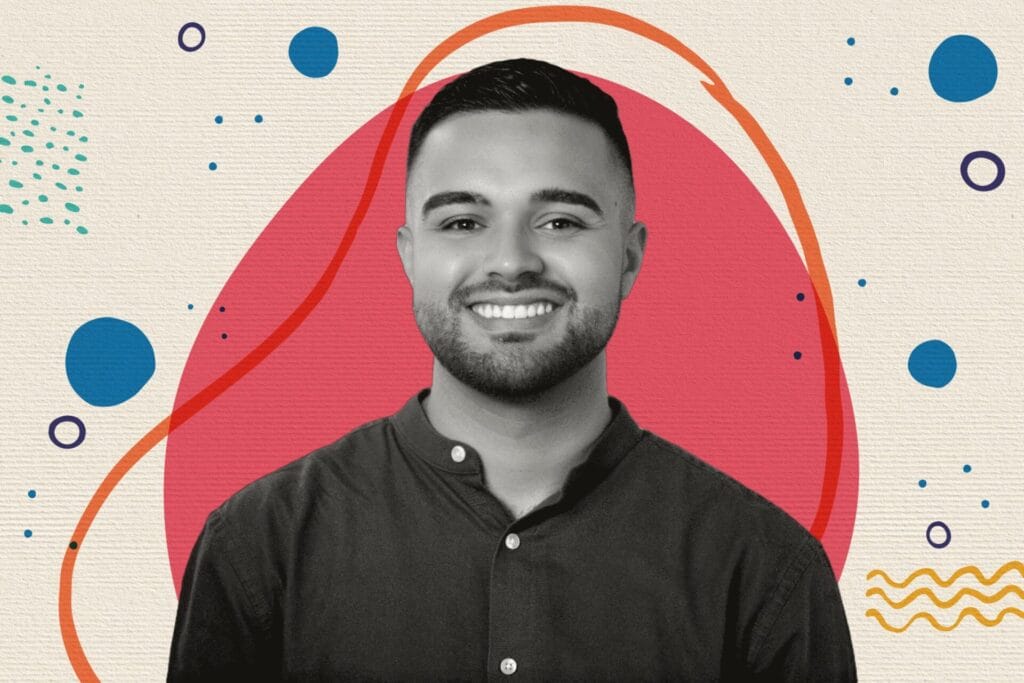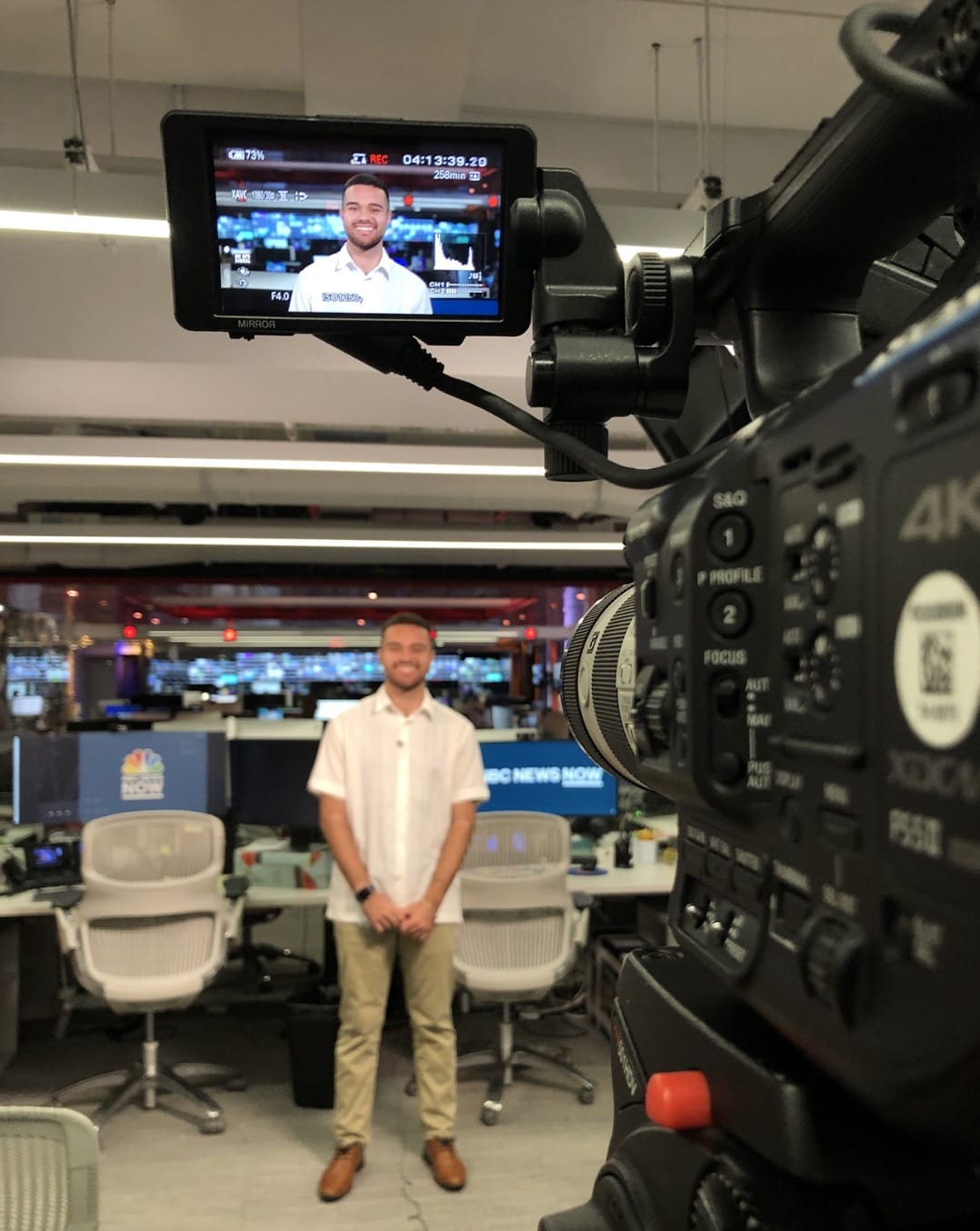English | Spanish

How reporting has helped mold my mixed identity
Editor’s note: This essay is part of the “Authentic Self” series, which is part of the initiative “More LGBTQIA+ Latinx in Newsrooms.” It aims to share stories and underscore the importance of hiring more queer reporters in newsrooms. The series is a project of the National Association of Hispanic Journalists’ LGBTQIA+ Committee, palabra and GLAAD. Words by Julian Berger (@julianrberger) |
Growing up in a protestant congregation during my childhood, my view of the church and the Christian faith during my time in college was not positive. I had grown distant from my faith as I began to come out and explore my sexuality, mostly because I was under the impression that being gay and Christian was not compatible.
In 2021, I began an investigative piece for my college publication on how up-keeping and renovations on local religious buildings have gone down and were under-resourced. Given their limited resources, churches had been reimagining what physical workshop space would look like.
In the months before starting this project, I felt nervous about interviewing church leaders. I feared facing homophobia due to my LGBTQ+ identity. However, attending the United Church of Chapel Hill changed my perception.
‘The inclusive newsroom I was writing for allowed me to bring my authentic self, offering a unique perspective on the complex intersection of identity and faith.’
Despite typical teachings in religion, almost half (46.7%) of LGBTQIA+ adults are religious, according to a 2020 report from the UCLA School of Law’s Williams Institute. And although a large number of queer people identify as religious, it has been more or less taboo to discuss sexuality outside of being heterosexual. Among young adults, like me, ages 18-24, only 38.5% identify as religious.
At the church, Pastor Cameron Barr welcomed LGBTQIA+ community members with open arms. Several of the church’s clergy members also identified as part of the LGBTQ+ community. Instead of facing backlash for being a queer Latino person, the pastor helped me and my colleagues tell this story.
I sat down one-on-one with the pastor, who was a married gay man and a practicing Christian, leading a congregation of other Christians. This pastor casually referred to his husband during the interview and we were sitting among LGBTQIA+ rainbow flags within a church building.
I was shocked to come into a worship space that accepted me and supported my sexuality. After leaving that church that day, I found a new sense of courage and strength. For the first time, I felt like I could co-exist with both my sexuality and my faith; a feeling I have so long yearned for.

Visiting this church allowed me to embrace being gay and religious. This reporting assignment allowed me to recognize that my sexuality and my faith could indeed coexist. It began a process of me realizing that not all religious people are homophobic and that I indeed could practice Christianity while also not conforming to traditional views on heterosexuality.
Reflecting on the profound impact of that reporting assignment, I am reminded of the transformative power of stepping beyond one’s comfort zone. The journey was not just about unraveling the layers of my own identity but also about challenging preconceived notions and stereotypes that had woven themselves into my understanding of sexuality and the church.
On a more general level, by increasing the presence of Latinx and queer reporters, media organizations can break down stereotypes, dispel misconceptions, and deliver more nuanced, accurate portrayals of diverse communities, like queer people who identify as religious.
—
Subscribe to palabra’s newsletter.
Julian Berger works as a production assistant for NBC News Daily. He previously interned as a prime-time intern for CNN and as a bilingual reporter for La Noticia. He earned a bachelor’s degree in journalism and Hispanic studies from the University of North Carolina at Chapel Hill. He has been a member of NAHJ since 2018, where he co-founded the NAHJ student chapter at UNC-Chapel Hill in 2020, and is a member of the newly created NAHJ LGBTQIA+ Committee.
Tat Bellamy Walker is the communities reporter for the Seattle Times, where he reports on diverse groups throughout the Pacific Northwest. Last year, he reported for NBC News’ diversity verticals (NBC Latino, BLK, OUT and Asian America). In 2021, he was named a Poynter-Koch Media and Journalism Fellow, where he joined more than 50 local journalists from newsrooms across the US. His work has appeared in the Daily Beast, Business Insider and CNN.
Luis Joel Méndez González reports on climate change and disaster recovery for the Center for Investigative Journalism through Report for America since 2022. He is an experienced data-driven and multimedia reporter. Méndez González holds a Masters Degree in Data Visualization and Information Design, and sits on NAHJ´s Board of Directors as General At-Large Officer. He´s also co-chair of the LGBTQIA+ Committee.
David Cordero Mercado is a multimedia and investigative journalist. He has reported on hate crimes in Puerto Rico as a reporter for El Nuevo Día, the biggest newspaper on the island. He earned a master’s degree in Communications with an emphasis in Journalism Innovation from Syracuse University in New York, and a bachelor’s degree in Information and Journalism from the School of Communication of the University of Puerto Rico, Río Piedras Campus, as well as a second concentration in Political Science. He is also the Region 1 Director on the Board of Directors of the National Association of Hispanic Journalists.
Fuera de la Zona de Confort

Cómo el periodismo ha ayudado a moldear mi identidad mixta
Nota del editor: Este ensayo de la serie “Ser Real” forma parte de la iniciativa “Por más periodistas LGBTQIA+ en las noticias” del Comité LGBTQIA+ de la Asociación Nacional de Periodistas Hispanos, palabra y GLAAD el cual busca compartir las historias y la importancia de contratar a más periodistas queer en los medios de comunicación. En cada ensayo se respetó el criterio personal de cada autor en el uso de lenguaje inclusivo. Reportaje de Julian Berger |
Crecí en una congregación protestante. Mi perspectiva sobre la iglesia y la fé cristiana durante mis años universitarios no fue positiva. Me distancié de mis creencias religiosas una vez que salí del armario y comencé a explorar mi sexualidad, pues estaba bajo la impresión de que la homosexualidad y la cristiandad no eran compatibles.
En el 2021 investigué para un periódico estudiantil cómo el mantenimiento y la renovación de las iglesias locales habían disminuido ante la falta de recursos económicos. Esta carencia las obligó a reimaginar y reinventar sus espacios.
En los meses previos a comenzar el proyecto sentí nervios sobre entrevistar a los líderes de la iglesia. Temía a la homofobia por mi identidad LGBTQIA+. Sin embargo, ir a la iglesia United Church of Chapel Hill cambió mi percepción.
‘Esta travesía no tan solo ha revelado cuán compleja es mi identidad, sino que ha retado todos los estereotipos que tenía preconcebidos sobre mi sexualidad y religiosidad’.
A pesar de lo que se tiene preconcebido sobre la religión, por lo menos la mitad (46.7%) de los adultos LGBTQIA+ son religiosos, de acuerdo a un reporte de 2020 de la UCLA School of Law’s Williams Institute. Pese a la gran cantidad de personas queer que se identifican como religiosas, discutir la sexualidad no heterosexual es visto como un tabú. Entre adultos jóvenes, como yo, de 18 a 24 años, solo el 38.5% se identifican como religiosos.
En la United Church of Chapel Hill, el pastor Cameron Barr recibía a miembros de las comunidades LGBTQIA+ con brazos abiertos. Varios miembros del clero se identificaban como parte de la comunidad. En lugar de enfrentar represalias por ser personas queer y latinx, el pastor me ayudó a mí y a mis colegas a contar la historia.
Me senté frente al pastor, el cual estaba casado con otro hombre practicante del cristianismo. Me habló sobre su esposo durante la entrevista mientras estábamos sentados en el interior de la iglesia rodeados de banderas arcoíris en honor a las comunidades LGBTQIA+.
Estaba perplejo. Había entrado finalmente a un espacio donde se aceptaba y apoyaba mi sexualidad. Luego de terminar la entrevista, me marché y encontré un nuevo sentido de valentía y fuerza. Por primera vez, mi sexualidad y mi fé podían coexistir en mí; una sensación con la que tanto había batallado.

Visitar esa iglesia me permitió abrazar mi sexualidad y mi religiosidad. Me permitió reconocer que ambos aspectos de mi vida podían coexistir. Comencé a entender que no todas las personas religiosas eran homofóbicas y que podía practicar mi religión sin amarrarme a la tradicional heteronormatividad.
Mientras reflexiono sobre el impacto de mi trabajo periodístico recuerdo cuán transformador puede ser salir de la zona de confort. Esta travesía no tan solo ha revelado cuán compleja es mi identidad, sino que ha retado todos los estereotipos que tenía preconcebidos sobre mi sexualidad y religiosidad.
Según incremente la presencia de periodistas latinxs y queer en los medios de comunicación, se romperán estereotipos, repelerán conclusiones erradas y los medios reflejarán más fielmente a las comunidades diversas: Por ejemplo, como los queers que somos religiosos, a pesar de los estereotipos.
—
Suscríbete al boletín de noticias de palabra.
Julian Berger trabaja como asistente de producción para NBC News Daily. En sus años de universidad fue pasante del conglomerado CNN y el periódico La Noticia. Se graduó con una licenciatura en periodismo y estudios hispanos de la Universidad de Carolina del Norte en Chapel Hill. Ha sido miembro de NAHJ desde 2018, donde ayudó a fundar el capítulo de estudiantes de NAHJ en UNC-Chapel Hill en 2020. Es miembro del Comité LGBTQIA+ de NAHJ.
Tat Bellamy-Walker es reportero para el Seattle Times. He reportado sobre temas de comunidades diversas para medios de comunicación como NBC. En 2021 fue nombrado Poynter-Koch Media and Journalism Fellow, donde se unió a periodistas de más de 50 redacciones a lo largo de Estados Unidos. Su trabajo ha aparecido en Daily Beast, Business Insider y CNN.
Luis Joel Méndez González es un periodista especializado en temas de cambio climático y recuperación en el Centro de Periodismo Investigativo a través de Report for America desde 2022. Se graduó con una maestría en Visualización de Datos y Diseño de Información de la Universidad de Northeastern y un bachillerato en Tele-Comunicación Radial de la Universidad de Puerto Rico en Arecibo. Forma parte de la Junta de Directores de la NAHJ en carácter de General At-Large Officer. Es integrante del Comité LGBTQIA+ de NAHJ.
David Cordero Mercado es un periodista multimedia e investigativo. Ha reportado sobre crímenes de odio en Puerto Rico contra las comunidades LGBTQIA+ como reportero para El Nuevo Día. Obtuvo una maestría en Comunicaciones de la Universidad de Syracuse en Nueva York y un bachillerato en Información y Periodismo de la Universidad de Puerto Rico, Recinto de Río Piedras. También es el Director de la Región 1 de la Junta de Directores de NAHJ.












